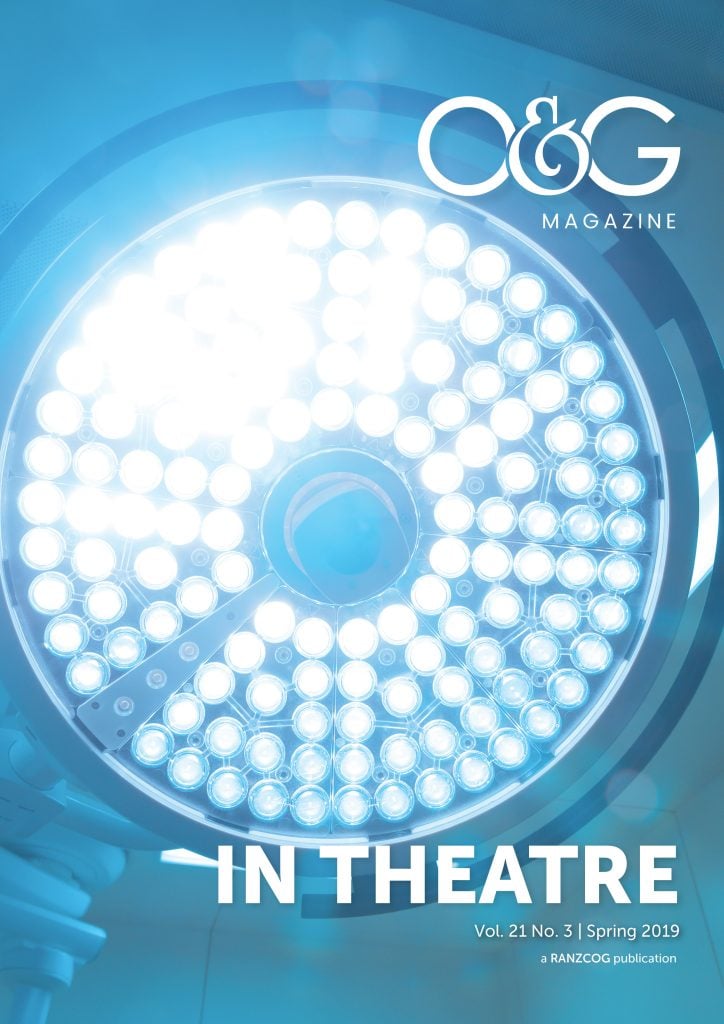This issue of O&G Magazine addresses a core attribute of our speciality – surgery. Surgical care has been an essential component of healthcare worldwide for over a century and underpins the practice of obstetrics and gynaecology. RANZCOG is committed to training surgeons to the highest standard through mentoring, simulation, assisting, primary operating and research. Exposure for our trainees to many surgical procedures has declined markedly, in less than a generation, with advances in non-surgical therapeutic options, availability of long-acting reversible progestogens and other pharmacological agents, declining parity and, generally, a more conservative approach to medicine. On the other hand, there has been a dramatic shift in the way that we perform surgery. Those of my vintage remember treating an ectopic or ovarian cyst via laparotomy or the advent of laparoscopy where you put your eye directly to the scope while trying to manipulate an inadequate instrument with one hand! We would kneel on the floor to perform a hysteroscopy, covered in fluids from various sources. As our talented authors outline, laparoscopic surgery with a television monitor is now the standard of care and we are rapidly exploring new frontiers with 3D laparoscopy, fluorescence and robotics. This has led to a significant improvement in outcomes for our patients, not just because of the technology, but because the techniques themselves address the underlying pathology more effectively, with the surgical management of endometriosis being the leading example.
The declining volume of procedural surgical training available to our trainees remains a concern and is discussed in one of the magazine articles. While commonly attributed to the increasing medicalisation of gynaecology, other factors also contribute, including changes in the workforce at all levels. The College is acutely aware of this issue and, in collaboration with our trainees, we have developed strategies to address this reduction in training opportunities, including a systematic review of surgical procedure numbers and training opportunities outside of traditional settings, both local and overseas. High quality, and appropriate quantity, in surgical procedural training remains a high priority for the College, recognising that, in order to deliver equitable access to healthcare for women in Australia and New Zealand, a workforce with a broad range of skills is the most desirable scenario.
Surgery is not without its negative and unintended consequences and I am pleased that the editors have challenged us with the issues of the ageing surgeon, the risk of infection and the need to audit our outcomes (you cannot know if you do not measure). Our profession has had to navigate the failure of systems, and ourselves, with the improper use of vaginal mesh that has had significant consequences for many women. While much of the blame lies with medical device companies and poor regulation, the College recognises that we too hold responsibility and we are actively supportive of better training and regulation through the establishment of a mesh registry, among other initiatives. We acknowledge that, when surgical complications occur, it is the patient who suffers.
The last few months have involved a lot of travel for the Board and as your President, the highlight was joining our colleagues in Hamilton, New Zealand for their RSM. The excellent scientific content was underpinned by the recognition and integration of Māori culture into every aspect of the program. Our brains were stimulated but, perhaps more importantly, we came away with a better understanding of the importance of connection with the land, ancestry and community and the relevance that this holds for us as medical practitioners. With Board member John Regan and CEO Vase Jovanoska, I joined many from Australia and New Zealand at the RCOG in London. Despite the wettest June since 2012, we enjoyed reconnecting with our UK colleagues and the cutting-edge presentations. The current President of RCOG, Prof Lesley Regan, will join us in Melbourne in October for our ASM and be presented with an Honorary Fellowship. We also congratulated President-elect Eddie Morris on his recent election. At the time of writing, I am about to fly to Port Moresby to join members of the Pacific Society for Reproductive Health for their ASM. I’m particularly looking forward to spending time with RANZCOG Fellow and luminary, Dr Glen Mola, whose contribution to Pacific women’s health
is extraordinary.
Within the College, there is a lot of activity. We are pleased to welcome a new Director of Education and Training, Olly Jones, who has extensive experience in Australia and overseas. Former College President Michael Permezel has commenced a new role as Dean of Education, reporting to the CEO and providing professional advice on educational matters to the College. We are currently preparing for the AMC Comprehensive Report for re-accreditation, due to be sent to the AMC in September 2019. The dynamic Andre Khoury joins the team as Head of Public Affairs and already has his finger on the pulse. Working closely with our Membership and Engagement staff, Andre has been monitoring media and increasing our social media output. Your President might become an influencer! The College, our members and the general public responded swiftly and vociferously to an opinion piece in an Australian newspaper questioning the place of men in obstetrics. We stated emphatically that a person’s sexuality, gender, race or religion does not determine their ability to provide competent or compassionate healthcare.
The College is more than an institution. It is the membership. It is you. This July we remember Dr Christopher Kollenberg, a dedicated specialist who contributed an enormous amount to teaching in Australia and the Pacific. He was also a committed College contributor serving on many committees, particularly as Chair of the NSW Training and Accreditation Committee. The NSW State Committee, Past President Ian Fraser and dear friends of the Kollenberg family, Henry and Marea Murray, joined Chris’ wife Cathy and daughters Ruth and Hannah for a special dinner to celebrate Chris’ life.
Finally, we return to the ever-present theme of culture, the importance of respectful communication and the negative impact on individuals and organisations when individuals and groups are marginalised, bullied or harassed. It has to stop, and we have to be active participants in improving the behaviour of doctors, supervisors and administrators, particularly in an environment of unequal power relationships. Unproductive criticism, hurtful or demeaning behaviour, sexist or derogatory comments have no place in our College and the consequences have, too often, been significant and inadequately addressed. The articles in this issue of O&G Magazine encourage us to ‘Operate with Respect’ and recognise that better communication and relationships will only improve our working environment, our own wellbeing and the outcomes for our patients.






Leave a Reply